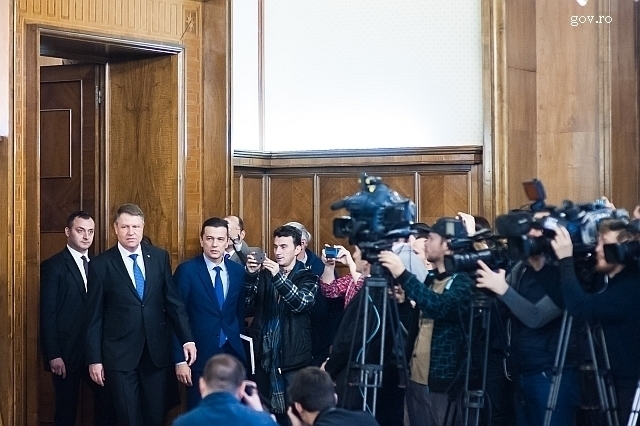Pardoning and the amendment of criminal codes under debate
Pardoning and the amendment of criminal codes are some of the most controversial initiatives of the new government

Bogdan Matei, 19.01.2017, 13:59
Thousands of people took to the streets on Wednesday night in Bucharest and other big cities across the country to protest against the intention of the new government to pardon a series of convicted persons and to amend the criminal codes. “We want justice, not corruption, democracy, not amnesty! was the leitmotif of the demonstrators, who explicitly accused political decision-makers of trying to release from prison their party colleagues, relatives and friends.
Earlier, information emerged that the cabinet was planning to adopt these measures without a public debate, which made president Klaus Iohannis go to the government headquarters and chair a meeting of Sorin Grindeanus cabinet. The president had previously expressed his categorical opposition to these changes, which he said were a means of clearing criminal records.
Already published on the justice ministrys website and sent to the main institutions involved for consultation, the drafts of the emergency ordinances in question provide for the pardoning of people serving up to and including 5 years in prison. A move to halve the prison sentences of people over the age of 60 who have in their care minors below 5 years of age and of pregnant women is also being considered.
Under the planned bill, the condition for pardoning is the payment, within a year of release, of compensations established by court. Also, the pardon does not apply to multiple offenders and persons convicted of violent crimes, crimes against national security and grand corruption.
The ordinance amending some of the provisions of the criminal codes stipulates that denouncers will no longer be exempt from criminal accountability unless they file their denunciation within 6 months of the moment the crime was committed. Moreover, abuse of office will be considered a crime only if the damage caused as a result exceeds the equivalent in lei of some 50,000 euros.
The Social Democratic justice minister Florin Iordache says these amendments are necessary to solve the problem of prison overcrowding, considering that there are almost 9,000 prisoners more than detention places and to harmonise the legislation with the decisions of the Constitutional Court. The minister recalls that Romania has already received a conviction from the European Court of Human Rights for bad treatment and what it called the “inhumane conditions in prisons. Iordache said around 2,500 people could benefit from the pardon law.
On the other hand, Romanias general prosecutor Augustin Lazar said he was firmly opposed to such acts of clemency. He accused the government of a lack of transparency and said the text of its proposals must be analysed by the Superior Council of Magistracy. The president of the Supreme Court Cristina Tarcea also warned that the proposed changes may cause chaos in courts and questioned the legal credentials of the cabinet members.






























